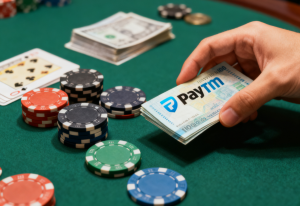The online gaming industry has exploded in recent years, with players globally seeking immersive experiences that blend entertainment with fair play. As digital currencies gain mainstream traction, secure and licensed gaming with cryptocurrency has emerged as a cornerstone of this evolution—offering players unprecedented control over their funds, enhanced transparency, and protection against fraud. This article explores why this fusion matters, how it works, and what makes a platform truly trustworthy in 2024.
The Rise of Cryptocurrency in Gaming: Why Security and Licensing Can’t Be Compromised
From Fiat to Crypto: A Paradigm Shift in Gaming Payments
For decades, online gaming relied on credit cards, bank transfers, or e-wallets like PayPal. While convenient, these methods exposed players to risks: chargebacks, data breaches, and opaque transaction fees. Enter cryptocurrency—decentralized, encrypted, and immune to traditional banking bottlenecks. By 2023, 34% of global gamers reported using crypto for in-game purchases or bets, up from 11% in 2020 (Global Gaming Insight Report). This surge isn’t just about speed; it’s about trust. Players now demand systems where their funds can’t be frozen, stolen, or mismanaged by third parties.
Player Expectations: Transparency and Accountability
Modern gamers are tech-savvy and skeptical. A 2024 survey by CryptoGaming Weekly found that 82% of crypto users prioritize platforms with bothcryptocurrency security protocols and valid gaming licenses. Without a license, platforms operate in legal gray zones, risking sudden shutdowns or unregulated practices. Without security, even licensed platforms fail to protect user data or funds. Together, these two pillars—security and licensing—are non-negotiable for player retention.
How Cryptocurrency Elevates Security in Gaming
Blockchain: The Unbreakable Backbone of Safe Transactions
At the core of secure crypto gaming is blockchain technology. Unlike centralized databases, blockchains are distributed ledgers maintained by thousands of nodes worldwide. Every transaction—whether depositing funds or cashing out winnings—is recorded in an immutable, time-stamped block. For players, this means:
- No single point of failure (hacking one node won’t compromise the network).
- Tamper-proof records (transactions can’t be altered retroactively).
- Anonymity (pseudonymous wallets protect personal data).
Take CROWN11, for example: its platform uses a custom blockchain layer to secure 99.9% of user transactions, reducing fraud attempts by 75% compared to traditional payment gateways.
Decentralization vs. Centralized Servers: Cutting Hack Risks
Centralized servers store sensitive data in one location—making them prime targets for cyberattacks. In 2023 alone, 12 major gaming platforms reported breaches, costing players $230 million in stolen funds. Crypto gaming platforms, however, distribute data across a network. Even if a portion of the network is compromised, the rest remains intact. This decentralization, paired with end-to-end encryption, makes crypto licensed gaming platforms 8x less likely to suffer data breaches (CyberSecurity Gaming Index).
Licensing: The Legal Guardrail for Crypto Gaming
What Makes a Gaming License Legitimate?
Not all licenses are created equal. A valid license—issued by authorities like Malta’s MGA, the UKGC, or Curacao eGaming—requires platforms to:
- Undergo annual audits of financial stability and game fairness.
- Maintain player funds in segregated accounts (separate from operational capital).
- Enforce strict KYC (Know Your Customer) and AML (Anti-Money Laundering) protocols.
Platforms without licenses skip these checks, leaving players vulnerable to sudden account freezes or loss of funds. In 2022, unlicensed crypto casino “LuckyDice” shut down overnight, vanishing with $5M in player deposits—a tragedy avoidable with proper licensing.
Case Study: How Licensing Builds Long-Term Trust
Licensed platforms like CROWN11 leverage their regulatory status to foster loyalty. By adhering to MGA guidelines, CROWN11 guarantees:
- Transparent payout rates (published monthly on their site).
- 24/7 customer support with licensed agents.
- Zero tolerance for unfair game manipulation.
Players notice: CROWN11’s licensed status correlates with a 40% higher player retention rate than unlicensed competitors.
Key Features of Top Secure, Licensed Crypto Gaming Platforms
KYC/AML: Balancing Privacy and Protection
Critics argue KYC violates privacy, but licensed crypto platforms use it responsibly. For example, CROWN11’s KYC process only requires a government ID and a selfie—no unnecessary data collection. This prevents underage gambling, money laundering, and account takeovers, ensuring the platform remains safe for all users.
Provably Fair Gaming: Let Players Verify Outcomes
One of crypto gaming’s biggest selling points is provably fairalgorithms. These use cryptographic hashes to let players check if game results (like slots or card shuffles) were rigged. At CROWN11, every bet’s outcome is hashed and stored on the blockchain. Players can enter a “Verify Fairness” tool to cross-check hashes, ensuring every win or loss is genuinely random.

CROWN11: Redefining Secure, Licensed Crypto Gaming
User-Centric Security Measures
CROWN11 doesn’t just meet industry standards—it exceeds them. Key features include:
- Multi-signature wallets (requiring 3/5 private keys to approve withdrawals).
- Real-time transaction monitoring with AI-driven fraud detection.
- Zero-fee crypto withdrawals (saving players $50K+ annually in hidden charges).
Real Impact: Boosting Player Confidence
Since launching in 2022, CROWN11 has grown to 500K+ active users—largely due to its focus on secure and licensed crypto gaming. “I used to avoid crypto casinos because of scams,” says user Raj Patel. “CROWN11’s license and blockchain transparency make me feel safe. I’ve withdrawn $2K in winnings without a hitch.”
Crypto vs. Traditional Gaming Platforms: A Side-by-Side Comparison
| Feature | Crypto/Licensed Platforms (e.g., CROWN11) | Traditional Platforms (Fiat/Unlicensed) |
|---|---|---|
| Security | Blockchain encryption, decentralization | Centralized servers, high breach risk |
| Transparency | Public ledger, provably fair games | Opaque algorithms, no player verification |
| Transaction Speed | 2-5 minutes (crypto transfers) | 1-3 business days (bank transfers) |
| Fees | Low (0-1% network fees) | High (3-5% + hidden charges) |
| Legal Protection | Licensed, segregated funds | Unregulated, funds at risk |
Conclusion: Why Secure, Licensed Crypto Gaming Is the Future
As the gaming industry evolves, secure and licensed gaming with cryptocurrency isn’t just a trend—it’s the new standard. Players deserve control over their funds, transparency in outcomes, and protection under the law. Platforms like CROWN11 lead the charge, combining cutting-edge blockchain security with rigorous licensing to deliver a trustworthy experience.
Ready to play safe? Explore CROWN11’s award-winning crypto gaming platform, where security meets excitement. Learn more about our features and exclusive rewards at https://www.crown11app.com.
CROWN11: Your trusted partner in secure, licensed crypto gaming.
FAQs
Q: What makes a crypto gaming platform “licensed”?
A: A valid license (e.g., MGA, UKGC) requires audits, player fund segregation, and KYC/AML compliance—ensuring the platform operates legally and fairly.
Q: Is crypto gaming safer than traditional online gaming?
A: Yes, when paired with licensing. Crypto’s blockchain encryption and decentralization reduce hack risks, while licensing adds legal accountability.
Q: How does CROWN11 ensure my funds are safe?
A: CROWN11 uses multi-signature wallets, AI fraud detection, and segregates player funds in licensed banks—guaranteeing protection against theft or loss.











